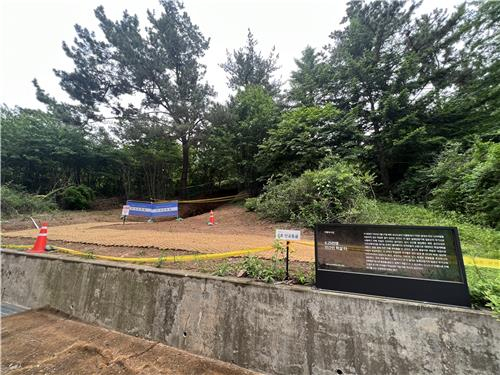 |
This photograph shows the underground cave in Singwan-ri, Gunsan, North Jeolla Province, where the North Korean military and its collaborators massacred Christians around the time of the 1950-53 Korean War. (The Truth and Reconciliation Commission) |
About 1,700 religious people in South Korea were massacred by the North Korean military, pro-North groups, and other hostile forces around the time of the 1950-53 Korean War, the state-run independent investigative committee on past endeavors said Wednesday.
The Truth and Reconciliation Commission, Republic of Korea have verified the complete list of religious people that had been killed across the country, based on records including the 1952 report by the now-defunct Bureau of Public Information and other reports by churches and religious groups across the country. It marked the first official tally of the number of people killed in connection with their religion during the war.
Based on its findings, the commission recommended the South Korean government to demand an apology from the North Korean regime, and support the projects for compensation and commemoration for those sacrificed.
It also decided to conduct further investigation on the exact nature and reasons behind the massacres of religious people around the time of the Korean War, and is set to announce its subsequent findings in order based on religion and region.
In what would be the first leg of the commission's findings, the TRCK said it has confirmed that 104 people related to 24 Christian churches in North Jeolla Province were killed between July and November of 1950 by North Korean troops or their collaborators. Over half of them were killed around Sept. 28, when the North Korean forces were retreating because the UN forces had successfully pulled off the Incheon Landing Operation.
A particularly brutal slaughter occurred in what is now the city of Jeongeup, where pro-North guerilla forces burned down the church and Christian homes, killing 20 people including children and elderly citizens.
The killings occurred because the Christians at the time were defined as "uncooperative" to the North Korean collaborators due to majority of them joining the rightist parties or defecting to the South after Korea's liberation from Japan in 1945, according to the TRCK. It was also noted that the pro-North groups in the region clashed with Christian groups over using churches for their rallies, along with the fact that the Christian groups had traditionally been close with US missionaries.
North Korea, a dictatorial regime functioning on hereditary leadership of the Kim family, remains repressive toward religion. It claims to allow activities of religious groups, but reports indicate that it is among the most repressive governments in the world when it comes to religious freedom.
In a survey conducted on 14,832 North Korean defectors, 99.6 percent said that religious activities are not tolerated in the country, according to the White paper on religious freedom in North Korea 2020 by the NGO Database Center for North Korean Human Rights.
About 98.6 percent of the respondents said that there is no government-approved place of prayer in regions outside of the North Korean capital Pyongyang, and the 1.3 percent who did say such places exist had never actually witnessed or visited one.







